In the new edition of 2011’s The Reactionary Mind, Corey Robin updates what is sure to become a classic in the history of political thought.
You can read my much longer “digested read” or “midrash” of the book here
As I write this the populist, Trump-lite and thuggish, Boss-Hogg lookalike Premier of Ontario has invoked what is called the “Notwithstanding Clause” to overturn a judge’s overturning of a bit of legislation that sought to reduce the number of elected representatives on the Toronto city council—a bit of parochial political dirty tricks that make Doug Ford (brother to Rob Ford, the infamous late Mayor of Toronto) seem the most small-minded conservative ever. Yet he has great support from his base for attacking the courts, those “un-elected” challengers to the power of (cough cough) the supposed will of the People. Ford is in fact just playing from the conservative (that is, the “reactionary’s”) playbook, which is analysed in great depth and to superb effect in Corey Robin’s 2017 re-issue and revision of his 2011 book, The Reactionary Mind: Conservatism from Edmund Burke to Donald Trump (which originally stopped at Sarah Palin, who is absent from this edition (alas?)).
The perennial aim of conservatism, Corey Robin claims, is to “build a broad-based movement of elites and masses against the emancipation of the lower orders”(xi)—to build a movement of the masses in support of the aims of the elite, in other words, to get the have-nots to campaign in favour of the haves. To do this, conservatives deliberately appeal to our worst natures, to “racism, populism, violence, and a pervasive contempt for custom, convention, law, [and] institutions”. And the first part of the book, “A Primer on Reaction”, brilliantly analyses the anatomy of reaction. What is the political “right” reacting against? In a word, “emancipatory movements of the left”(xvi), movements that yearn for ever-increasing freedom for the oppressed. What does the right desire to protect? What Robin calls “the private life of power”. Conservatism above all loves submission to hierarchy, and maintains its status by giving almost everyone in that hierarchy a sense that they are superior to at least someone else. Movements of the left threaten, with their appeal to “equality”, the stability of hierarchies everywhere—not only in the political arena, but between employer and employee, between men and women, and between races and nationalities. Robin spends a lot of time on Edmund Burke here—and to great effect, as that 18C pamphleteer and philosopher embodies much of the contradictory spirit of that family which has Burke as its patriarch.
Of chief concern for Burke was the aesthetic notion of the sublime, which he opposes to the beautiful in a manner which parallels his opposition of aristocratic to democratic politics: when we encounter the sublime (in a work of art, or in nature) we are threatened with annihilation: nature is so vast, and our puny reason cannot fathom it (for starters). We stand on a precipice in the mountains and lose ourselves in awe and wonder at its mystery and majesty.
We come away from the experience, from this imaginary (or real) brush with death both cleansed and invigorated—and this, Burke maintains, is exactly what politics needs: strong men who live active lives of constant struggle who rule over the masses by sheer will because of an inner nobility of spirit that they (and few like them) possess, and we masses don’t.
The conservative is aware, however, that the masses seem to have history on their side, and so constructs a narrative of loss and victimhood: the conservative is one who sees a golden age in the past, and dreams of political reaction: of going back to that past, or rather of carrying what is allegedly best about that past into the present and to struggle against those political foes who would “flatten” those noble aristocratic values of the ancien regime.
There is no going back to feudalism, of course, so capitalism becomes the terrain on which that agonistic struggle for noble values is to be waged—as well as on the actual battlefield, as there runs through conservatism two streams, which tend to privilege one of the pair, subordinating the other: the political conservative values nation building and military conquest, projecting national glory on an international stage (our modern “neo-cons” of the Bush era get a look in late rin the book, but I would have liked to have seen a lot more on them, especially their indebtedness to the University of Chicago professor Leo Strauss, who is absent from this book, alas). The economic conservative, by contrast, accepts the free markets of the political liberal or (in the historical and not American sense of the word) or radical (in the British 18C sense), but sees in them something that is uniquely conservative: an arena where modern-day aristocrats (our brawny Elon Musks and Machiavellian Jeff Bezoses) can wage economic battle with each other.
Conservatives thus have a tough time with peacetime, with prosperity, and tend to look upon its pleasures as fleeting but above all as strength-sapping. Burke associates it with the Beautiful, and saw the ancien régime as giving way to lassitude and indolence. Neo-cons had the same problem with us in the 1990s: If we spend too much time shopping, what are we? This is a conundrum for all conservatives who also want to promote the virtues of the free market. For a while 9/11 seemed to promise to inject some of the old sublimity into American discourse (and provide a new enemy to struggle against), but that was a chimera, of course, as Black Friday looms larger on the shopping and cultural calendar with each passing year (good for me, it’s also right around my mom’s birthday).
A lot of this Aristocratic stuff may remind you of Nietzsche, and you’d be right for thinking so. Though he himself despised petty bourgeois businessmen and had time only for the manly capital-A Artist, the so-called “Marginalist” school of economists who followed in his wake responded partially to the idea of Adam Smith that labour was the source of economic value, but also partially to Nietzche’s cultural diagnosis: whither God? Whither meaning? (He is dead, and we killed him…blah-blah) What will replace Him with? What shall be the foundation of capital-V Value? Nietzsche’s Answer: Art, via the Will to Power! Marginalist’s answer: Capitalism! For it is in our economic choices where our most secret heart is hiding—we may say “Save the whales!” but if we put our money out not for a whale-saving campaign, but to go see Jurassic Park XVI and slurp some slushy with a plastic straw that kills those very whales, then voilà! Behold our actual values!!
The Marginalists themselves came in several flavours:
Those who followed Joseph Schumpeter (1883-1950, popularizer of the term “Creative Destruction“) tended to view things from the capitalist’s end, and imagined that the Entrepreneur could continue on as a modern-day aristocrat, battling it out with his equals, but “in the office and at the counting-table” (manly yes, but I like it too! Went that 1970s soap commercial). In this domain (if nowhere else) he is a powerhouse of force and will, a Machiavellian Prince, a founder of destinies. We still have some of these myths floating about today, and Ayn Rand is largely responsible for that.
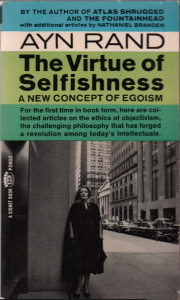
She never read Schumpeter as far as I know, but she read her Nietzsche, and in her novels the hero-capitalists are always thwarted unjustly by small-minded bureaucratic foes (well, that’s what I remember from grade seven, which is probably the best time to get her brand of narcissistic, kitschy fascism into & out of your system lickety-split). Did you know, though that 800,000 copies of her books were sold in the year of the economic crash, 2008, alone? Robin’s chapter on her is great fun, witty and perceptive, and argues that it was her experience of writing in Hollywood, not living under communism in Russia, that most shaped and inflated her melodramatic grandiosity. Oh, and did you know that while her family was literally starving in said Russia, as a teen she went out and treated herself to a movie? Yup. Oh, and (one of ) her lover(s) was Alan Greenspan, architect of her 2008 book-stravaganza….
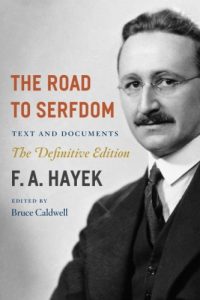
The problem with Schumpeter, as the other Marginalist/Austrian, Friedrich Hayek (1899-1992), saw it, was that the age of the Entrepreneur was drawing to a close. The modern corporattion was sneaking Nietzsche’s hated socialistic slave mentality into capitalism via the back door, or the shipping bay. Whatever, the age of the individual-capitalist as-medieval-lord seemed drawing to a close (really?), so the smart, wilfull businessman will shift from production to the game of becoming something really Nietzschean: he will become an elite, aristo-Artist, an powerful Engineer of Human souls, the very first rank of the cultural avant-garde—a taste-setter if you will, he who will tell us what we shall and shall not desire. The capitalist as the acknowledged “cultural legislator” of mankind. His notion of what was needed for this, liberty (not for us, for the capitalist-legislator: “liberty may be neither possible nor desirable for the great majority,” he wrote). He had big fans in 1960s fascist Portugal, by the way, and Chilean dictator Pinochet’s 1980 constitution is named after Hayek’s 1961 book The Constitution of Liberty Oh, and he’s pretty much a god in certain sacrosanct think-tanks in Washington, along with that other aristo Ludwig von Mises….
Finally, Corey Robin takes us to America, where he sees a lot of the aforementioned themes repeat themselves, not as farce (OK, Rand excepted) but as tragedy. First he gives us a chapter on Barry Goldwater (1909-98), the man who lost spectacularly to JFK, but who in doing so took conservatism to an old new place: he despised the idea that it was all about free markets (though he did love them too, they had their place..), which was a classical liberal notion.
Goldwater figured liberals had reduced Homo Sapiens to Homo Economicus, and he would give a conscience (not a heart, that wishy-washy pansy of a thing) back to the movement, and to the working man: Goldwater widened the conservative base by telling the worker that conservatives valued the whole human being, not just the worker’s pocketbook—though he would help there, too, but by giving him tax cuts, choice, not government programs. He would set the working man free from Big Government.
But when conservatives speak of freedom/liberty, they are being disingenuous, as they have always privileged the idea of subordination, of hierarchy, of “submission”(194). Freedom is merely a “proxy for inequality”, allowed the “initiative and ambition of uncommon men” to rise to the fore. It is a means to an unfree end. According to Karl Mannheim, conservatives
often champion the group—races or nations—rather than the individual. Races and nations have unique identities, which must, in the name of freedom, be preserved. They are the modern equivalents of feudal estates. They have distinctive, and unequal, characters and functions; they enjoy different, and unequal, privileges. Freedom is the protection of those privileges, which are the outward expression of the group’s unique inner genius.Goldwater parsed this traditional conservative union of nationalism and racism, favouring the former but not, in theory, the latter, though his championing of states rights in effect argued for white racism in the south by default.
I’ll mostly skip over the chapters on Supreme Court justice Antonin Scalia (an originalist interpreter of the constitution who remains greatly influential, and who valued the Burkean agon life-as-sublime-struggle ethos highly—with a postmodern twist) and the NeoCons of the Bush era (mentioned in passing earlier) to end, in Chapter 11, on Donald Trump. One has to wonder if Robin was making a subtle joke here, as “Chapter 11” is a “space” in US bankruptcy law where companies seek protection from their creditors so that they can attempt to revivify their falling fortunes through re-structuring (layoffs, etc.). One has to assume that Trump himself has been there quite a bit…Anyhow, he is depicted as a canny, formidable synthesiser of all of the aforementioned reactionary ideas, but which are also ultimately bankrupt, the empty rhetoric of the would-be fascist who in policy terms has been largely reclaimed by the mainstream pro-big business mothership. His racist dog-whistling and nativism are all there, sure, as is his unique economic populist spin, but largely his entire political career rests on his own sheer inconstancy, his willingness to never mean what he says, or mean everything he says, who knows, what does he even mean?
Corey Robin analyses Trump’s 1987 book The Art of the Deal for clues. Shockers: what Trump is really about, it turns out, is getting attention: “Bravado” and “truthful hyperbole” are his self-chosen key words in that book, and Robin notes that they are not “a sideshow to the economy”, they are the economy (257):
“A lot of attention,” says Trump, “alone creates value.” A lot of attention—not the productivity of labor, design of the engineer, vision of the entrepreneur, risk of the investor, or genius of the advertiser—that alone creates value. At the heart of his celebration of economic combat and struggle is a dim awareness that its only justification is itself. The game is the game.
If the older economic Darwinists believed, with Trump, that the game was “glorious”, they also believed that the game’s “outcome” was, too. Trump affirms that sentiment, but also undercuts it: it is truth and lies at the same time.
“It is everything; it is nothing. It shall be all; it is naught. Rand grounded her vision of capitalism in A is A; Trump grounds his in A is not A.” Trump’s book, in the end, is a “parody of [Dante’s] journey into the hell of capitalism, but at the end of that journey nothing is revealed to us by our Virgil” “there is no secret […] It is a show about nothing” (258).
Yet he is the President of the United States, and that show has real-life consequences, some of which (says Robert Paxton) bear a resemblance, in their rhetoric of “passionate nationalism” at least, to fascism, with that “sense of grievous dishonor and shame” and the “longing for re-enchantment of the state”, that “desire for national restoration and global domination”(260). The most telling thing about that rhetoric, though, is that underneath it lies a most “economistic” political vision, one in which “Trump often sees in matters of state nothing but the transactions of the market. Money is the instrument of state power. Money is the end of state power.”. He may say that China is a “‘military threat'”, and that it is our “‘enemy'”, but in practice he is actually obsessed with trying to “‘out-negotiate the Chinese'” (261). Similarly, his main concern over Iraq was not the political, moral or human costs, but the costs in dollar terms! “It’s that ‘we should have hammered out the repayment plan with the Iraqis. . . before we launched the war.’ The Iraq War, in other words, was a bad deal (my italics). This is again similar to his own practices in the sphere of business, where he relished the “combat” of the courtroom, appearing as either “plaintiff or defendant in more than 4,000 lawsuits” (263).
How this will play to the swing voters in the rust-belt (those who voted for Obama, but not for Hilary, those who responded to the economic populism rhetoric, not to the calls to Build That Wall etc. etc.) remains to be seen. Trump said he would go after Wall Street, kick the plutocrats where it hurts, yada-yada. Mostly he has signed into law, with that great signature of his, whatever Paul Ryan and Mitch McConnell have put in front of him to sign. Robin’s tracking of his career as a Pinnochio playing an actor playing a demogogue-in-chief ends in very early 2017, so we’ll have to wait for the next book to find out why what’s going to happen will have happened. This Corey Robin guy is that good, folks.
I would have liked to have seen much more on Leo Strauss, and also on how conservative thought has dovetailed with neoliberalism in thought and practice (for primers on which I also suggest Davis Harvey’s A Brief History of Neoliberalism and Mark Blyth’s Austerity: The history of a Dangerous Idea) Nevertheless, I highly recommend this book. As well please do visit his blog at http://coreyrobin.com/.
If you found this review was not at all that useful, but perhaps way-too-chatty/schematic, you can read my in-depth gloss on the book (sort of a summary/exegesis, and what I like to think of as a very small-m “midrash” ), chock-a-block with quoted text, or better yet buy the book itself, read it and give it to a friend! Most folks don’t even know what the terms “conservative” and “liberal” mean anymore, and we gotta start pulling the curtains back on these wizards of Wall Street & the Beltway….
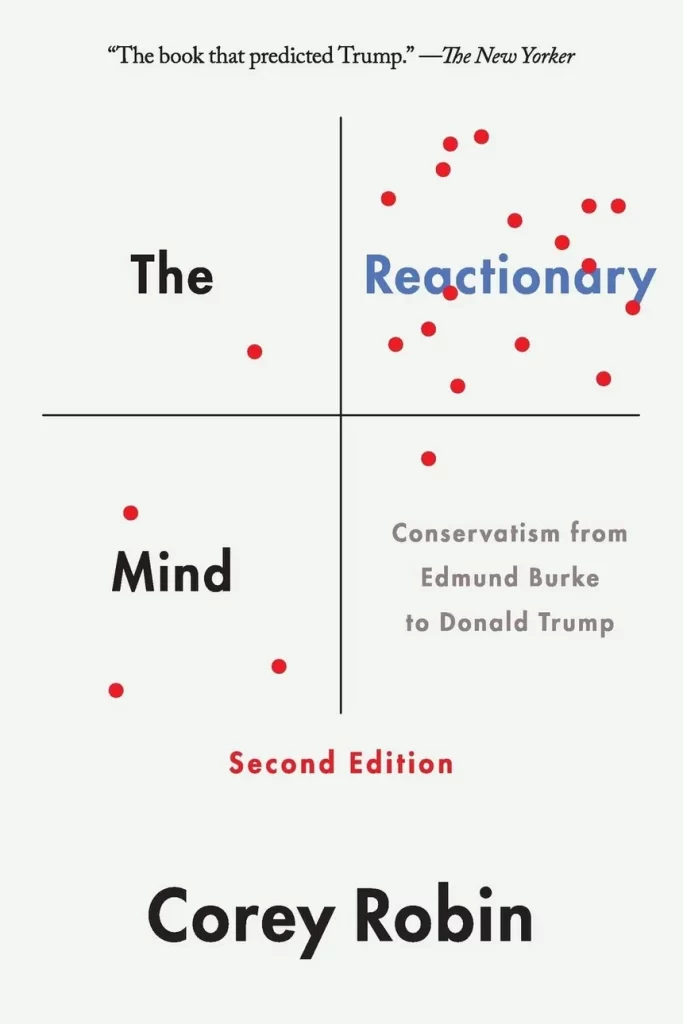
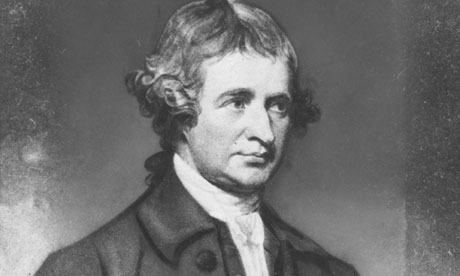
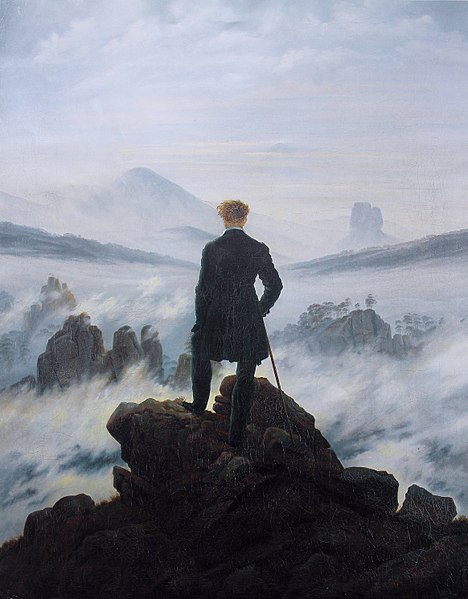
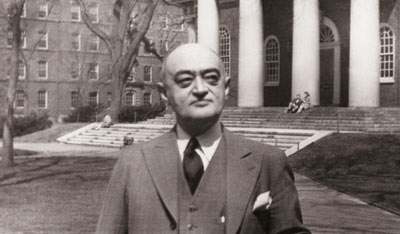
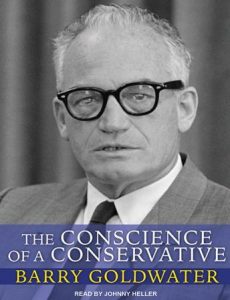
Nice work Bill!
Superb recount, Bill, and from your paragraph sadly so relatable to the ones in power in my country (who name Burke as their inspirator), scolding judges as unworldly when not dismissing their laws violating human rights.
Thank you both!